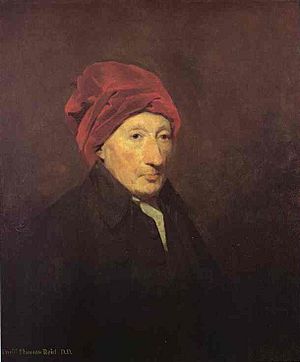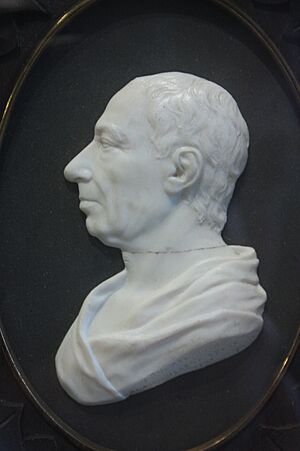Thomas Reid facts for kids
Quick facts for kids
Thomas Reid
FRSE
|
|
|---|---|

Reid as painted by Henry Raeburn in 1796
|
|
| Born | 7 May 1710 Strachan, Scotland
|
| Died | 7 October 1796 (aged 86) Glasgow, Scotland
|
| Alma mater | University of Aberdeen |
| Era | 18th-century philosophy |
| Region | Western philosophy |
| School | Scottish common sense realism Scottish Enlightenment Epistemological externalism Direct realism Foundationalism Correspondence theory of truth |
|
Main interests
|
|
|
Notable ideas
|
|
|
Influences
|
|
|
Influenced
|
|
Thomas Reid (1710–1796) was an important Scottish philosopher. He is famous for his ideas about "common sense." He believed that our basic beliefs about the world are true.
Reid also developed a theory of how we perceive things. He thought we directly see the world as it is. He also wrote a lot about ethics (what is right and wrong) and how we make choices.
He started the Scottish School of Common Sense. This group of thinkers played a big part in the Scottish Enlightenment. He was also a founder of the Royal Society of Edinburgh. Reid was a strong critic of another famous philosopher, David Hume.
Contents
Life of Thomas Reid
Thomas Reid was born in a place called Strachan, Scotland, on May 7, 1710. His father was a minister. He went to the University of Aberdeen when he was just 13 years old. He earned his degree in 1726.
After college, he became a minister in the Church of Scotland. But in 1752, he became a professor at King's College, Aberdeen. There, he earned his doctorate degree. He also wrote his first important book, An Inquiry Into the Human Mind on the Principles of Common Sense, which came out in 1764.
While in Aberdeen, he and his friends started a group called the 'Wise Club'. This was a club for discussing ideas. Soon after his book was published, he became a professor at the University of Glasgow. He took over from another famous thinker, Adam Smith.
Reid stopped teaching in 1781. He then worked on publishing his university lectures. These became two more books: Essays on the Intellectual Powers of Man (1785) and Essays on the Active Powers of the Human Mind (1788).
Thomas Reid married his cousin Elizabeth in 1740. Most of his children passed away before him. He died in Glasgow in 1796. His tombstone is now at the University of Glasgow.
Thomas Reid's Philosophy
What is Common Sense?
Thomas Reid believed that "common sense" should be the base for all philosophy. When he said "common sense," he meant our natural, basic beliefs. These are beliefs that almost everyone shares.
He disagreed with philosophers like David Hume and George Berkeley. Hume thought we could never truly know the outside world. Berkeley believed the world was only ideas in our minds. Reid, however, said that our common sense tells us there is a real world outside our minds.
Reid thought that these basic beliefs are not just opinions. Instead, he believed that our ability to reason actually depends on them. For example, we all naturally believe that:
- We are talking to real people.
- There is a real world around us.
- The laws of nature do not change.
Reid argued that if someone denies these basic ideas, it's hard to even have a discussion with them. He felt that believing in these common sense principles is a sign of being reasonable.
How We See and Understand Things
Reid also had interesting ideas about how we perceive the world. He said there's a difference between 'sensation' and 'perception'.
- Sensation is what our senses feel, like seeing colors or feeling warmth.
- Perception is when we understand that these sensations come from a real object.
For example, when you see a red apple, the sensation is the color red. The perception is knowing that it's a real apple in front of you. Reid believed that we directly perceive objects as real. We don't just see ideas of them in our minds.
He also thought that language helps us understand the world. He believed that language has two parts:
- Natural signs: These are like gestures or sounds that naturally show meaning. Think of a baby crying to show it's hungry.
- Artificial signs: These are the words we use today. They have meanings that we learn, but they don't naturally sound like what they mean.
Reid said that artists often use "the language of nature." They help us see the world in a fresh, direct way. This is similar to how a child experiences things before learning all the complex rules of adult language.
What Influenced Reid and Who He Influenced
Thomas Reid's ideas were very important in his time. His philosophy was taught in many colleges, especially in North America.
Some philosophers, like Immanuel Kant and John Stuart Mill, criticized his work. However, his ideas have become popular again more recently. Modern philosophers, especially those interested in religion, find his work helpful. They use his ideas to argue that believing in God can be reasonable, even if it's not based on other proven facts.
Reid wrote several important books:
- An Inquiry into the Human Mind on the Principles of Common Sense (1764)
- Essays on the Intellectual Powers of Man (1785)
- Essays on the Active Powers of the Human Mind (1788)
Other Important Ideas
Reid also had strong beliefs about free will. He thought that humans are truly free to make their own choices. He believed we are the real cause of our actions. This means we can be praised or blamed for what we do.
He also disagreed with John Locke about personal identity. Locke thought that our memory of past experiences is what makes us the same person over time. Reid argued that memory isn't the only thing that makes us who we are. He believed that even if we forget something, we are still the same person.
Finally, Reid believed that the way our minds work, connecting sensations to a belief in an outside world, points to a wise Creator. He offered arguments for the existence of God. One argument was that everything must have a cause, leading back to a first cause (God). Another argument was that the natural world shows clear signs of being designed, which means there must be an intelligent designer.
Works
- 1764. An Inquiry into the Human Mind on the Principles of Common Sense.
- 1785. Essays on the Intellectual Powers of Man.
- 1788. Essays on the Active Powers of the Human Mind.
See also
 In Spanish: Thomas Reid para niños
In Spanish: Thomas Reid para niños
 | James B. Knighten |
 | Azellia White |
 | Willa Brown |


